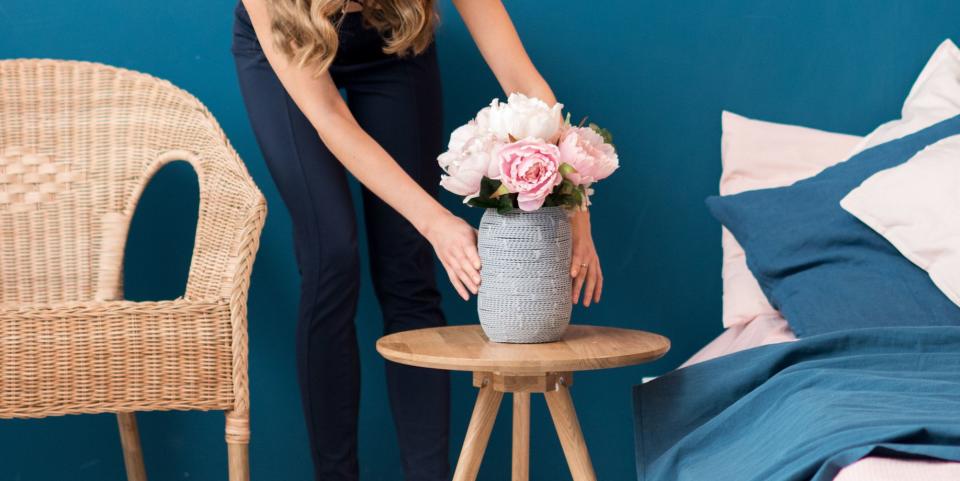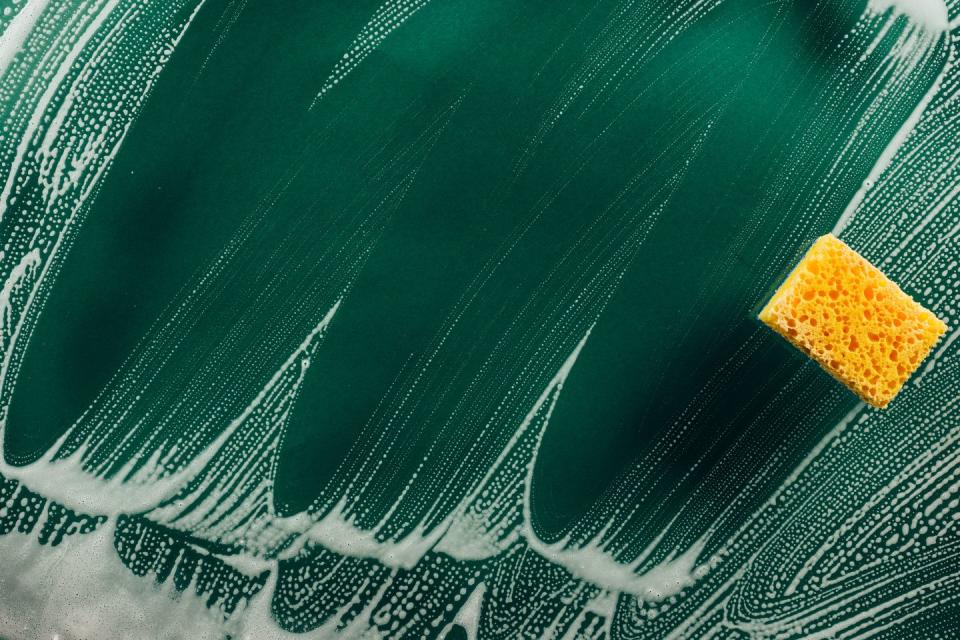Spring Cleaning Can Help Manage Stress, According to Psychologists

It’s officially spring cleaning season - the time of year to freshen up your home after the dark days of winter. Believe it or not, putting in a little elbow grease can do wonders for your mental health - something I recently discovered myself.
Over the last three months, I have been dealing with more-than-usual anxiety due to a personal issue. My "normal" life - which involves attending industry events, watching favorite TV shows, and socializing with friends - is on hiatus while I solely juggle family responsibilities and work deadlines. And in the ultra-limited amount of free time that I’ve had these days, I’m not enjoying the stress-relieving activities that typically bring me a sense of peace, like napping, getting a Swedish massage, or doing the warrior pose on the yoga mat. Instead, I’ve been cleaning my home - and not because my place resembles a war zone, but because the act of cleaning actually makes me feel good.
There was one morning when a friend texted me to find out how I was holding up. My response: "Doing three loads of laundry, including my comforter, pillow shams, and two throw blankets. Also washed a bunch of my baseball caps in the dishwasher 😊" I wasn’t being facetious with that emoji, either.
While I’m by no means a slob, I’m also not a neat freak, so I’ve been wondering why I’d rather head to the laundromat or recycling bins instead of hopping on a massage table. As it turns out, I’m not the only one who behaves this way. A full 70% of Americans say tidying their home offers them a feeling of accomplishment, 61% say it makes them feel "destressed," and 54% say they experience "relaxation," according to a survey of 2,000 adults released by OfferUp (a marketplace for local buyers and sellers in the U.S.).
The Psychology Behind Cleaning

There’s some science behind the connection between cleaning and decreased anxiety, as well. A small study published in the journal Mindfulness found that participants who engaged in mindfully washing the dishes - meaning they took a moment to inhale the scent of the soap and to allow their skin to absorb the warmth of the water - reported a 27% reduction in nervousness, along with a 25% improvement in "mental inspiration."
Temporary anxiety can lead to cleaning more meticulously, according to a 2015 study from University of Connecticut. Researchers theorized that people gravitate toward repetitive behaviors (such as cleaning) during times of stress. Why? It’s all about control.
"We want to be able to do something when we get anxious, and what we really want is to be in control and take action," says Alicia H. Clark, Psy.D., a licensed clinical psychologist and author of Hack Your Anxiety: How to Make Anxiety Work for You, in Life, Love, and All That You Do. "While there are times we have to accept some situations in life, we do not have to accept an untidy home."
She further explains that "healthy anxiety" (anxiety that is not debilitating or stands in the way of one’s daily responsibilities) is a normal emotion that can be beneficial. "It grabs our attention to the things we care about the most,” Dr. Clark continues. "It's energy being generated without an outlet. Anxiety can cause a lot of angst and unsettled feelings, yet it’s supposed to be motivating."
In fact, she discusses the healing powers of cleaning with her patients. "When we look at our environment, we take it all in visually," she says. "If we’re already dealing with a lot in our mind and now we’re looking at a lot [of dust or stuff] in our home or office space, it can make us feel stuck and bogged down."
How Clutter Affects Your Brain

On a subconscious level, clutter is likely to be linked with negative emotions (confusion, tension, irritability, worry) whereas a clean space is more likely to be linked with positive emotions (happiness, calm, a sense of wellbeing), explains Sherrie Bourg Carter, Psy.D., psychologist and author of High-Octane Women: How Superachievers Can Avoid Burnout.
Interestingly enough, this concept ties into a 2010 study published in Personality and Social Psychology Bulletin, which found that females living in a cluttered home showed higher levels of the stress hormone cortisol.
"In our minds, we view clutter as unfinished business, and this lack of completeness is unsettling and stressful to most people," Dr. Carter states. Furthermore, she adds that this is the main reason why real estate agents suggest home sellers tidy up their residence. "Prospective buyers try to visualize themselves living in a home, and the negativity associated with clutter makes it feel like a place where they wouldn't feel comfortable or wouldn't be happy."
When I confessed to Dr. Clark that I’ve been on a cleaning kick, she applauded my efforts and labeled my newfound hobby as "excellent self-care."
"Yes, you’re taking control of something that you can, but you’re also making your environment more soothing," she explains. "Since there are other concerns occupying your mental state, you cannot tolerate disorder because you need tolerance for what is going on with the bigger issues in your life."
Lastly, both Dr. Clark and Dr. Carter emphasize that devoting any amount of time to cleaning and decluttering - even 10 minutes per day - can help minimize anxiety.
"You’d be surprised at how much you can accomplish … I bet you can unload your dishwasher, reload it, and clean off your counter in 10 minutes,” Dr. Clark says. "There is no shame in outsourcing chores, but right under our nose are these opportunities to get rid of everyday stressors. It’s really empowering."
If you're struggling with anxiety and depression and need professional help, the American Psychological Association's Psychologist Locator tool can help you find a licensed therapist in your area that takes your insurance.
Follow House Beautiful on Instagram.
('You Might Also Like',)
19 Closet Organization Ideas You'll Want to Steal Immediately
15 Styling Tricks That Make A Small Living Room Seem Bigger Than It Is

